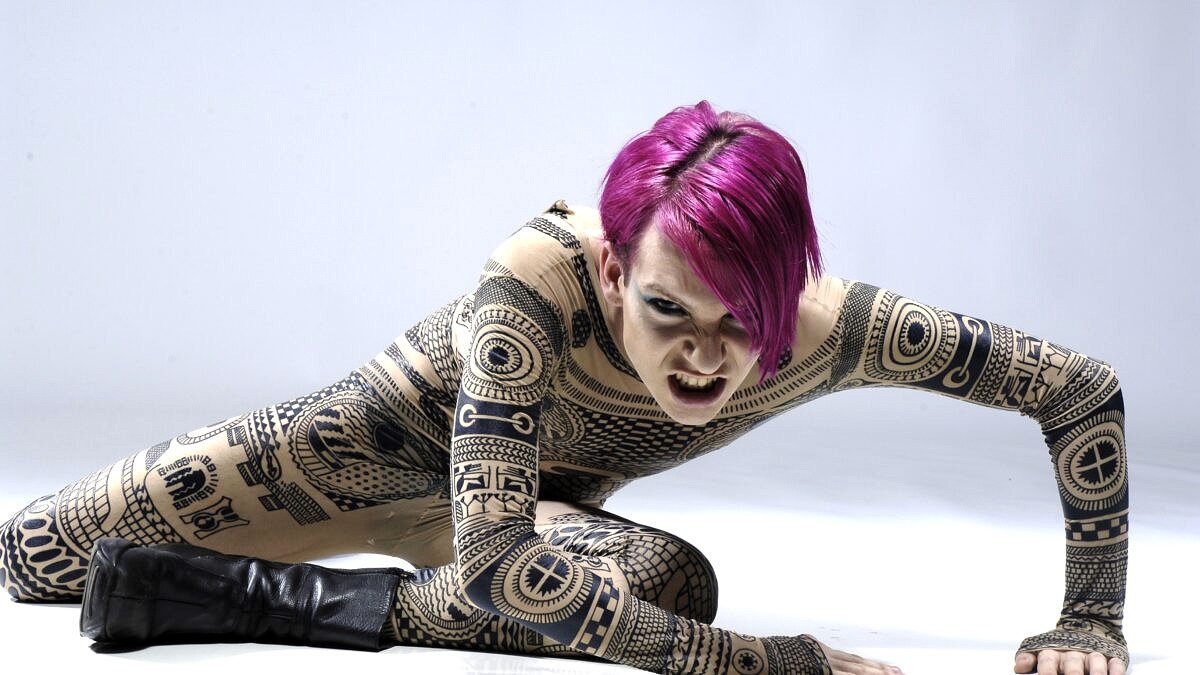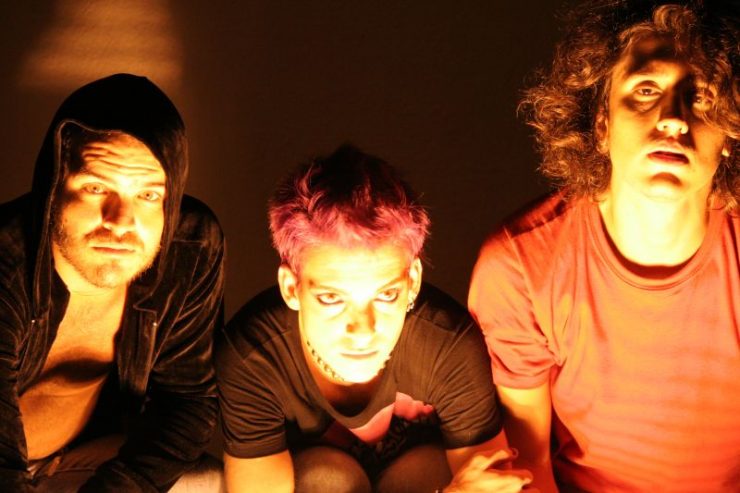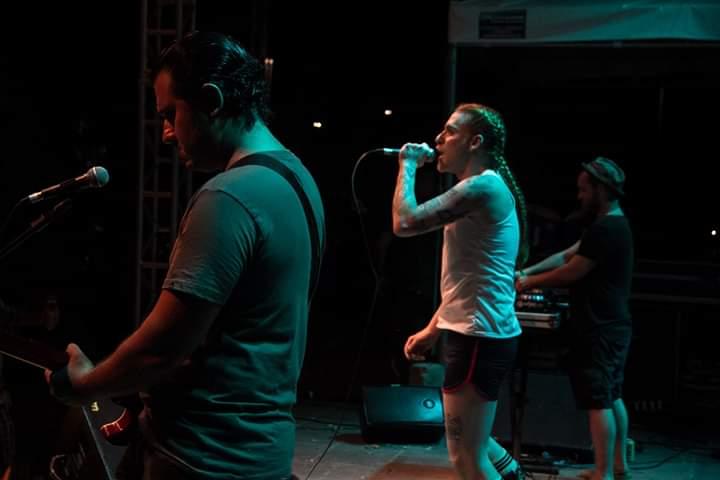
It was on Friday, January 21, 2005, that Montage took to the stage for the first time, at the late Noise 3D Club. Located at Praia de Iracema, in Fortaleza, the venue was responsible for and indispensable to the musical and cultural formation of a whole generation in the city where I was born. There were no more than 30 people in the audience, most of them friends, a few acquaintances of the band and some innocent bystanders. Our first show was an explosive, sensory and very intuitive event; most of it was improvised.
A few weeks before, Leco Jucá and Patrick Bachi had given me the backing tracks for the songs. The journalist Ricardo Lisboa, who at the time worked with me on the Asterisco Program, was the mentor for the whole thing. He had the feeling and vision that this meeting could work. Using the backing tracks, I wrote the lyrics for what would be some of our greatest songs, including Ode To My Pills (Benflogin), I Trust My Dealer, Hi Oprah! and Blue Cartoon, as well as adapting the umbanda verses for the female Pombagira spirit into an electropunk track that would later become Raio de Fogo.
I was dressed in a black skirt and tank top that I still have today (and they still fit me!) I had shaved, bleached hair. I was inspired by the most androgynous phase of Garbage’s Shirley Manson. I thought to myself, “What would Marilyn Manson or Madonna do now that the lights are on and I need to entertain those people who don’t know any of the songs I’m going to sing?”
So, it was there in our city of Fortaleza, that our debut show – with my feminine and delicate, but aggressive and chaotic figure, allied with two straight boys – found fame based on word of mouth, in an era when there was only dial-up internet and smartphones were still only a dream. Less than a month later, we were back at the Noise 3D for our second show. We were already on the cover of the biggest newspapers in Ceará, featured in an article on Globo’s Jornal Hoje, going nationwide, and creating a lot of fuss.

The audience of 30 people had now multiplied into hundreds that filled Rua José Avelino, just outside the Dragão do Mar culture center, for a show that was sold-out tickets. In 2006, one year after our debut, the national pop magazine, BIZZ, spelled out over a two-page spread how Montage was the missing link in the Brazilian LGBTQ scene, since the success of DJ Mauro Borges and his project Que Fim Levou o Robin? in the 90s.
After a six year break, we resumed our activities in 2015. Our music only reaching the digital platforms in 2018, creating a delay between our sound and the new generation of listeners. We used to distribute CD-Rs of our music to our original public when we first emerged.
I am very proud to tell this story, not from any egotistical point of view, but because of the enormous joy of having brought a little weirdness and subversion to the press, showing the possibility of being different to the norms of society at the time and, especially, opening the discussion about gender identity and queer culture.

When we were spreading our sound throughout Brazil I was also bringing the message of: “If a young lad from the sticks in Ceará, accompanied by two guys who play a Roland 307 groovebox and a guitar, are managing to bring LGBT to rock festivals across the country and in the world’s leading newspapers, you can do it as well!” Other important acts came to the fore, each with their own story to tell, including Cansei de Ser Sexy, Bonde do Rolê, NoPorn, Impostora and Multiplex.
During Montage’s trajectory, a moment of particular pride was in bringing Claudia Wonder back to the stage as a singer in 2006. I was already living in São Paulo, and I realized that she was unknown to the new generation, so I invited her to participate in our shows. She arrived, perfectly presented and beautiful, singing with us. The following year, Claudia released an excellent electro album as wellas being the subject of the documentary Meu amigo Claudia, by Dácio Pinheiro.
But it wasn’t all a bed of roses. We had moments of acclaim, but we also received criticism, homophobic attacks, hatred on the social networks and all types of aggression in a country where drugs, sexuality and religion were not talked about openly, topics that were normal for us. In our songs, the villains were the good guys, LGBTQs were the protagonists and the so-called “minorities” were embraced and welcomed.
Thankfully we’re not dwelling on past glories. We’re still alive and kicking. We’ve been producing an album to celebrate our debut 15 years ago, but the coronavirus pandemic brought that to a halt. We’ll resume as soon as the dust settles. But, over the past 15 years several fantastic queer artists from the brand new Ceará scene have popped up. The following is a list of 15 LGBTQ artists who have appeared on the Ceará scene and who are doing a fine and inspiring job, honouring a legacy built on sweat, tears and a lot of alcohol.
1. Getúlio Abelha
Originally from Piauí, Getúlio has lived in Fortaleza for many years and it was there that he started his career as a musician. Acclaimed for his originality and fierce stage presence, he has already amassed many underground hits; I’m sure there will be many more. Getúlio was a guest at the Montage show during the last Virada Cultural de São Paulo and we’re planning on releasing a single together in August (!!!). I see a lot of Montage in Getúlio, from the visual elements and anarchism, to the debauchery in the lyrics and performances, all brought together in his own unique personality and talent.
2. Verónica Valentino
Verônica first came to prominence through the viral success of GLOSSário das Bixas, which won an award at the 19th edition of Festival Mix Brasil. After that she focused on her band, Verónica Decide Morrer, releasing music, video clips, and touring Brazil with her punk sound, spreading the word of how she left the evangelical church to become the most popular transvestites in Ceará. She has had a clip directed by Jesuita Barbosa and also done the soundtrack for the documentary about Indianara Siqueira.
3. Procurando Kalu
Established in the city of Sobral, in 2013, the group mixes psychedelia with rock and popular music, with vocals and an inpired presence from Zeca Kalu. They’ve circulated extensively not only in Ceará but in festivals throughout Brazil. They are also on the 1st episode of the programme Porto Dragão Sessions, which I present on the Music Box Brazil channel and TVC.
4. Luiza Nobel
Luiza is beautiful! Singer, songwriter, actress and lioness, hers is a voice of freedom and strength, underlined by her experience as a black woman from the periphery. Through her art she discusses the female empowerment of black women from the periphery in songs by Vinicius de Moraes and Chico Buarque or her own compositions. In 2019, she joined the Music Laboratory of the Porto Iracema das Artes School under the mentorship of Mahmundi, putting together a show of original material, entitled Luiza Nobel, as well as winning at the Elas por Elas and Juventude Festivals. She has become a major presence in Fortaleza, and has already shared the stage with Elza Soares and played for 1.5 million people at the official Fortaleza New Year’s Eve party.
5. As Travestidas
This collective, headed by Gisele Almodovar, the drag persona of Silvero Pereira, started in the theater and soon built up a public in venues around the city, eventually participating in one of the most beloved carnival parties in Fortaleza, the Bloco das Travestidas. Gisele has released the single Minhas Rules, a re-reading of New Rules by Dua Lipa, while her carnival partner Mulher Barbada has just released the great track Ressaca.
6. Pulso de Marte
The duo has been active since 2014, with a great and original mix of pop, rock and a touch of hardcore. Like Luiza, they also participated in the Porto Iracema das Artes music laboratory, under the tutelage of Raquel Virginia (of As Bahias and Cozinha Mineira). From that experience, they released an album, Marte é Mulher, produced by the talented Paulo Oliveira, (who has played guitar with Montage as well as on the solo projects).
7. Luh Livia
Luh is a rock girl! She was the vocalist with Mafalda Morfina, a contemporary of Montage for more than a decade, until she embarked on a solo career and performed with such rock icons as Paralamas do Sucesso and Pitty. She recorded Poderosa Imperfição with Bruno Gouveia, vocalist with Bikini Cavadão. Gifted with a a powerful and unmistakable voice, the singer will release her next album on Sony Music.
8. Glamourings
Glamourings present themselves as “the fruit of reflection and artistic resistance, fighting prejudice, ignorance, sexism and LGBTQIAphobia.” The band was started by Melindra Lindra and Tina Reinstrings and is produced by Fernando Catatau, the man behind the revered Cidadão Instigado. I love their sound, a Fortaleza sound, with hints of trip hop, intelligent lyrics and well constructed melodies.
9. LUA
LUA truly is a prodigy who appeared on the scene in 2012, aged just 16, in the Intuicion project, and since then has participated in several musical projects around the city, as well as running the Berlim Tropical label. The music embraces regional roots music, such as forro and carimbó, aligned with dance music and technopop. Recently, he released Atlântico, an album produced by Omulu.
10. Fervô (Yara Canta and Pelizari)
This was a project that made pop music a lot of fun, embraced by the pocs, the young gay kids, while it lasted. I performed with them at the Fica, Vai Ter Pop festival, in 2018, when I met them and became an immediate fan! Yara and Pelizari now have their own have solo projects. He has an EP, opened shows for Jaloo and Duda Beat and produces the Musicalize festival. She is an important trans activist, trained in theater, who continues to sing a repertoire of Brazilian music and is also part of Terra Prometida, a collective formed by trans people.
11. Arquelano
Arquelano is an electronic music project headed by singer, composer and music producer Benjamin Arquelano. The work brings together electronic music and elements of MPB, pop, R&B and soul, with lyrics on his experiences as a young black man and LGBTQ who travels daily between two cities with different realities, Maracanaú and Fortaleza. After being tutored by Mahmundi, in 2019 he released his first EP, which has already yielded the singles Ponto and Estava, as well as appearances with Getúlio Abelha and Luiza Nobel in Salão das Ilusões. The video clip for this song is beautiful!
12. SelvaBeat
I met this band of powerful women last year at the Music Fair in Fortaleza and I was struck by the strength of their presentation (there’s also a guy in the band). SelvaBeat are a constant feature at the explosive Viva La Vulva party, where performers, DJs, visual artists, actresses and poets also participate. A show for the women on stage and in the audience, celebrating artists and cultural workers. They are more than a band or party, but an event, which I would very much like to see conquer the rest of the country.
13. Davi Bandeira
Davi is from my hometown Cariri, a longtime friend from before the time he sang with me in the Madonna tribute shows, The Immaculate Tribute. Talented and determined to build a solid career in pop music, he has been in São Paulo for two years, where he has been attracting attention. His latest single, Dói, Mas Passa (Mesmo), featuring Tchelo Gomez, from Quebrada Queer, debuted at # 1 on iTunes. Davi has also written a track for The Voice Kids TV show.
14. Stefany Mendes
She is one of those figures who most resemble a force of nature. I met Stefany one night in Fortaleza, when she came to chat with me and we connected. She is a singer, rapper, producer and songwriter, a trans activist of indispensable presence on the outskirts of the city. She is the coordinator of the collective Polo Trans, which she founded in 2016 at the Conjunto Ceará. Stefany turned up (uninvited) with a rainbow flag on Johnny Hooker‘s stage and he handed her the microphone immediately, while she improvised. A historical and exciting moment!
15. Henrique Vivazz
Henrique identifies himself as a non-binary trans artist, singer and songwriter, with a very pop sound with echoes of funk, reggae and electro. He started in 2018, and now has several singles, guest appearances and videos released, in addition to the album Transição, in which he explores all these traits.
Let me finish by mentioning a few other DJs and electronic producers who are making the scene boil not only in Ceará, but throughout Brazil. EVVA, Marcio Motor, Kysia, Ruth Love, Monic. Look out for these names, the styles and sounds are multiple and varied, and I’m sure you will identify with many. Enjoy!
Originally published by Revista Hibrida. (C) 2020 Daniel Peixoto

